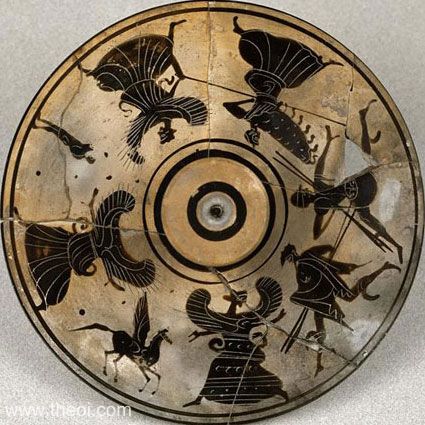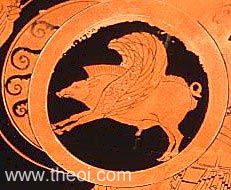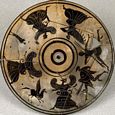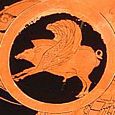KHRYSAOR
Greek Name
Χρυσαωρ
Transliteration
Khrysaôr
Latin Spelling
Chrysaor
Translation
Gold-blade (khrysos, aor)

KHRYSAOR (Chrysaor) was a son of the Gorgon Medousa (Medusa) who, together with his twin-brother Pegasos, was born from the bloody neck-stump of his beheaded mother.
Khrysaor was usually described as a giant but, at times, may have been envisaged as a winged-boar. The vase painting right depicts such a creature on the shield of Khrysaor's son Geryon.
Khrysaor's name means "golden-blade" which could be a sword, tusks, or, as in the case Demeter's title Khrysaoros, a reference to golden blades of wheat.
FAMILY OF CHRYSAOR
PARENTS
[1.1] POSEIDON & MEDOUSA (Hesiod Theogony 278, Apollodorus 2.42, Hyginus Pref & Fabulae 151, Nonnus Dionysiaca 31.13)
OFFSPRING
[1.1] GERYON (by Kallirrhoe) (Hesiod Theogony
287)
[1.2] GERYON (Stesichorus Geryoneis,
Ibycus Frag 282A, Apollodorus 2.42, Hyginus Pref & Fabulae 15, Diodorus Siculus 4.17.1)
ENCYCLOPEDIA
CHRYSAOR (Chrusaôr). A son of Poseidon and Medusa, and consequently a brother of Pegasus. When Perseus cut off the head of Medusa, Chrysaor and Pegasus sprang forth from it. Chrysaor became by Callirrhoë the father of the three-headed Geryones and Echidna. (Hesiod, Theog. 280, &c.; Hygin. Fab. Praef. and 151.)
Source: Dictionary of Greek and Roman Biography and Mythology.
CLASSICAL LITERATURE QUOTES

Hesiod, Theogony 280 ff (trans. Evelyn-White) (Greek epic C8th or C7th B.C.)
:
"But when Perseus had cut off the head of Medousa (Medusa) there sprang from her blood great Khrysaor
(Chrysaor) and the horse Pegasos (Pegasus) . . . while Khrysaor is named for the golden aor, the sword
he handles."
Hesiod, Theogony 966 & 979 ff (trans. Evelyn-White) (Greek epic C8th or C7th
B.C.) :
"Sing out now the names of those goddesses who went to bed with mortal men and, themselves immortal, bore
to these children in the likeness of immortals . . .
Kallirhoe (Callirhoe), daughter of Okeanos (Oceanus) lying in the embraces of stout-hearted Khrysaor (Chrysaor)
through Aphrodite the golden bore him a son, most powerful of all men mortal, Geryones (Geryon)."
Stesichorus, Geryoneis Fragment S10 (trans. Campbell, Vol. Greek Lyric III) (Greek
lyric C7th to C6th B.C.) :
"[Menoites (Menoetes) urges Geryon to recalll his parents :] ‘Your mother Kallirhoe (Callirhoe) and
Khrysaor (Chrysaor), dear to Ares.’"
Stesichorus, Geryoneis Fragment S11 :
"[Geryon] the mighty son of immortal Khrysaor (Chrysaor) and Kallirhoe (Callirhoe)."
Stesichorus, Geryoneis Fragment S87 (from Scholiast on Hesiod's Theogony) :
"Geryon is son of Kallirrhoe (Callirhoe), daughter of Okeanos (Oceanus) , and Khrysaor (Chrysaor)."
Pseudo-Apollodorus, Bibliotheca 2. 42 (trans. Aldrich) (Greek mythographer C2nd A.D.)
:
"When he [Perseus] saw Medousa (Medusa), he beheaded her. As soon as her head was severed there leaped from
her body the winged horse Pegasos and Khrysaor (Chrysaor), the father of Geryon. The father of these two was
Poseidon."
Lycophron, Alexandra 840 ff (trans. Mair) (Greek poet C3rd B.C.) :
"The harvester [Perseus] who delivered of her [Medousa's (Medusa's)] pains in birth of horse [Pegasos] and
man [Khrysaor (Chrysaor)] the stony-eyed weasel whose children sprang from her neck."
[N.B. The ancient Greeks believed the weasel birthed its young from its mouth so Medousa, whose children were
birthed from her neck-stump, is here named "weasel".]
Diodorus Siculus, Library of History 4. 17. 1 (trans. Oldfather) (Greek historian
C1st B.C.) :
"The cattle of Geryones (Geryon), which pastured in the parts of Iberia [Spain] which slope towards the
ocean. And Herakles, realizing that the task called for preparation on a large scale and involved great
hardships, gathered a notable armament and a multitude of soldiers as would be adequate for this expedition. For
it had been noised abroad throughout all the inhabited world that Khrysaor (Chrysaor, Golden-Sword), who
received this appellation because of his wealth, was king over the whole of Iberia, and that he had three sons
[i.e. the three-bodied Geryon] to fight at his side, who excelled in both strength of body and the deeds of
courage which they displayed in contests of war; it was known, furthermore, that each of these sons had at his
disposal great forces which were recruited from warlike tribes. It was because of these reports that Eurystheus,
thinking any expedition against these men would be too difficult to succeed, had assigned the Herakles the
Labour just described."
Pseudo-Hyginus, Preface (trans. Grant) (Roman mythographer C2nd A.D.) :
"From Neptune [Poseidon] and Medusa [were born] : Chrysaor and the horse Pegasus.
From Chrysaor and Callirhoe [was born] : three-formed Geryon."
Pseudo-Hyginus, Fabulae 151 :
"From Medusa, daughter of Gorgon, and Neptunus [Poseidon], were born Chrysaor and horse Pegasus; from
Chrysaor and Callirhoe, three-formed Geryon.”
Ovid, Metamorphoses 4. 786 ff (trans. Melville) (Roman epic C1st B.C. to C1st A.D.)
:
"While deep sleep held fast Medusa and her snakes, he [Perseus] severed her head clean from her neck; and
from their mother's blood swift-flying Pegasus and his brother [Khrysaor (Chrysaor)] sprang . . . she [Medusa],
it's said, was violated in Minerva's [Athena's] shrine by the Lord of the Sea (Rector Pelagi)
[Poseidon]."
Nonnus, Dionysiaca 31. 13 ff (trans. Rouse) (Greek epic C5th A.D.) :
“As Medousa (Medusa) was slain [by Perseus], the neck was delivered of its twin birth, the Horse [Pegasos]
and the Boy with the golden sword [Khrysaor (Chrysaor)].”
ANCIENT GREEK ART
SOURCES
GREEK
- Hesiod, Theogony - Greek Epic C8th - 7th B.C.
- Greek Lyric III Stesichorus, Fragments - Greek Lyric C7th - 6th B.C.
- Apollodorus, The Library - Greek Mythography C2nd A.D.
- Lycophron, Alexandra - Greek Poetry C3rd B.C.
- Diodorus Siculus, The Library of History - Greek History C1st B.C.
- Nonnus, Dionysiaca - Greek Epic C5th A.D.
ROMAN
- Hyginus, Fabulae - Latin Mythography C2nd A.D.
- Ovid, Metamorphoses - Latin Epic C1st B.C. - C1st A.D.
BIBLIOGRAPHY
A complete bibliography of the translations quoted on this page.

